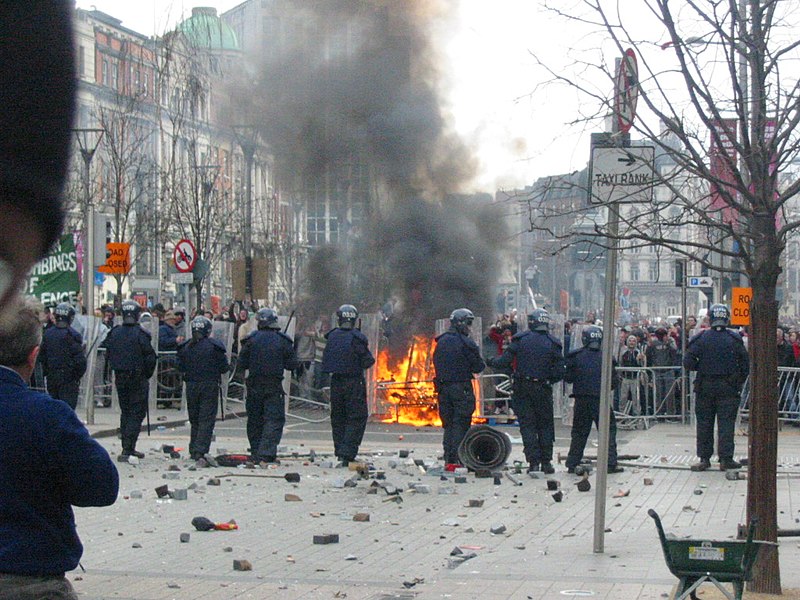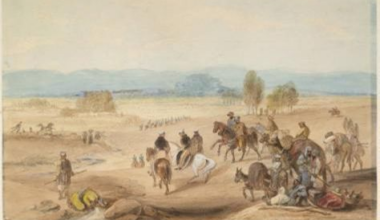If you want the wise man to be as angry as the atrocity of men’s crimes requires, he must not only be angry, but must go mad with rage.
– Seneca, De Ira
Suddenly the world seems an angrier place. One could indeed be forgiven for believing anger to be the defining emotion of our time. Gallup’s annual poll on world emotional well-being shows a general increase over the last twenty years in people’s negative emotions, in their levels of stress, sadness, anger, worry, and physical pain. More concrete metrics, such as levels of ‘road rage’, show significant increases. And our societies seem riven by the politics of rage, by the rise of extreme movements of left and right, by frustration against the status quo and decadent elites, by the demonisation of others, by raging Karens and riots and protests and hatred. The complexity scientist Peter Turchin has diagnosed our era as a tinderbox of resentments caused by elite overproduction and popular immiseration. Political polarisation is festering into social polarisation, with partisans increasingly unwilling to associate with the other side. The American National Election Studies reported in 2016 that nearly 90% of respondents reported anger at the opposing side, up drastically from the nearly 50% of mere decades before. Eight years later, the 2024 election has radiated toxicity and violence.
Just as worryingly, anger has become normalised in Western public discourse. Sometimes, it is even actively revelled in and encouraged as a means to justice and virtuous citizenship. In popular culture, it is apparent in the increasing fixation on angry anti-heroes, serial killers, and villains. In politics, it might seem most evident in the populist right—in the ‘Rage’ of Bob Woodward’s book on the first Trump presidency. But it can also be clearly seen on the other side of the spectrum, in the demonstrations of recent years over the Middle East, race relations, and gender, and in the dispositions of the latest breed of social activists such as Ta-Nehisi Coates, Greta Thunberg, and the Australian First Nations politician Lidia Thorpe. In a recent rally in Australia, a Palestinian activist summed up the overheated atmosphere when she chanted, ‘We come with anger, we come with rage, we come with frustration at the failure of this government.’
***
But what does such rage do to our politics and society? Like seemingly everything these days, the question provokes intense disagreement. On the one hand, many global traditions have condemned anger as a fundamentally negative phenomenon that needs to be repressed. Rage is literally the first word of one of the oldest extant works of Western literature, The Iliad, whose fundamental theme is the wrath of Achilles bringing tragedy to both Greeks and Trojans. Aristotle defined anger as ‘a desire, accompanied by pain, for revenge for a perceived belittling of oneself or anything of one’s own’. The person who is angry wants the ‘person he is angry at to suffer in return, while [the hater] wants the person he hates not to exist’ (Rhetoric, 1378a-b, 1382a). The Roman Stoic Seneca wrote a whole treatise ‘On Anger’ lamenting it as ‘a temporary madness’. The Christian tradition rejects it as opposed to love and charity. And Buddhism, according to the philosopher Jesse Prinz,
counts anger as one of the three mental poisons, or kleshas; in Tibetan depictions of the Wheel of Life, anger is personified as a snake at the very center of the wheel, which, along with a bird (attachment) and a pig (ignorance), causes the unenlightened masses to remain trapped in a cycle of endless rebirth.
On the other hand, many in recent years have seen anger not only as a critical tool for grappling with injustice but as foundational for our moral knowledge itself. This claim derives ultimately from the British moral sentimentalists of the seventeenth and eighteenth centuries, such as David Hume, and has been revived by philosophers since the 1960s. The arguments have been further strengthened by recent psychological studies, such as those of Jonathan Haidt, which argue that our moral reasoning is mostly just post hoc rationalisation of our intuitive responses. Such arguments rightly note that anger is more than just a feeling but involves some form of judgement about the perceived wrongness of a state of affairs. We get angry not just because something bad has happened but because it ought not to have happened.
If anger involves recognition of a violation of some sort of value, it must also be a way to communicate and act against this violation. Evolutionary psychologists argue that it is a disciplinary emotion with a function to punish violations and restore order. Indeed, Aristotle argued that righteous indignation, a proportionate and correct anger at wrongdoing, was a necessary spur to justice, that, just like pity, it was a ‘mark of good character’ to ‘be indignant at those who fare well without deserving it’ (Rhetoric, 1386b). Contemporary philosophers Agnes Callard and Amia Srinivasan attempt to further rehabilitate anger by denying (contra Martha Nussbaum) that it is always vengeful. They see it instead as a potential manifestation of care, or the desire for recognition, following a breakdown in relationship expectations.
For such writers, then, anger is a legitimate act of political communication, a way of, in Srinivasan’s words, ‘affectively registering or appreciating the injustice of the world’ and the suffering of victims. Myisha Cherry has recently argued in her book The Case for Rage (2021) that anger is the entirely appropriate response to systemic injustice. ‘Anger’, she writes,
plays the role of expressing the value of people of color and racial justice, it provides the eagerness, optimism, and self-belief needed to fight against persistent and powerful racist people and systems; and it allows the outraged to break certain racial rules as a form of intrinsic and extrinsic resistance.
It empowers the oppressed, giving them a sense of control and dignity against the degradation and dehumanisation of oppression. This argument is a watered-down form of that famously made by the arch-postcolonialist Frantz Fanon in The Wretched of the Earth (1961) and summed up by Sartre in that book’s preface in his typically hyperbolic manner:
The colonised cures himself of his colonial neurosis in hunting the coloniser with his weapons. When his rage break outs, he re-finds his lost transparency, he knows himself in the same measure in which he makes himself… To kill a European is to kill two birds with one stone, to suppress at the same time an oppressor and an oppressed…
While not endorsing this violent rhetoric, Cherry and others argue that any criticism of political rage is yet another form of oppression, a way of imposing dominant cultural norms or correct forms of expression on the marginalised. Others even claim that dismissing political rage as exaggerated or unhelpful is a form of social gaslighting. Indeed, a whole new subfield of philosophy is devoted to complaining about affective injustice, or ‘the injustice of having to negotiate between one’s apt emotional response to the injustice of one’s situation and one’s desire to better one’s situation’. These writers claim that if the rage is ‘apt’ then any pernicious consequences are irrelevant. Srinivasan dismisses the ‘invocation of “rationality” (like the invocation of “civility”)’ as ‘an invocation of the status quo’, which puts the responsibility upon the oppressed rather than the oppressor. And Cherry boldly states that ‘the failure of a potential ally to empathise with the person expressing rage isn’t a problem with the rage itself—it’s a problem with the potential ally.’
***
There is some truth to these claims. Callard is surely right that there is something inhuman in not being angered by injustice, that ‘[i]nhibiting any and all anger in the face of genuine wrongdoing is acquiescing in evil.’ Yet, ultimately, anger is a poor foundation for justice. Being angry at something is not in itself an argument against it. Most people would concede that one can be angry at the wrong things or in the wrong amount. If anger must be ‘appropriate’ or ‘apt’, then there needs to be a standard beyond the anger itself to assess whether it is right or wrong. This standard must be amenable to reason unless we want to fall into a moral chauvinism or relativism that leaves no room for any justice at all. Indeed, the arguments that moral judgements are in principle irrational or post hoc rationalisations generally wither under scrutiny. It is true that our moral judgments are often ‘pre-theoretical’, in the sense that we have not explicitly reasoned them through in every case, but this does not mean that they lack any rational grounding. They emerge dialectically from our general understanding of the world, of the facts, and of right and wrong, and they are subject to change in the face of rational reflection.
Anger, then, is neither necessary for our moral judgements nor helpful. As Allan Bloom pointed out in The Closing of the American Mind (1987),
Indignation may be a most noble passion and necessary for fighting wars and righting wrongs. But of all the experiences of the soul it is the most inimical to reason… Anger, to sustain itself, requires an unshakeable conviction that one is right.
Seneca likewise warned that ‘The sword of justice is ill-placed in the hands of an angry man.’ Anger closes us off to the world, destroys humility, and floods over fine distinctions. ‘Bitterness’, Martin Luther King once said, ‘has not the capacity to make the distinction between some and all.’ Regardless of how one tries to quarantine good anger from bad, it leads to grudges and nagging resentments which resist the cold lights of reason and fact. Anger too long held, as most moral traditions teach, becomes a festering cancer of the soul. Insatiable, it consumes our world, destroying all truth, beauty, and goodness. Dorothy Parker in one of her stories once remarked that,
If you looked for things to make you feel hurt and wretched and unnecessary, you were certain to find them, more easily each time, so easily, soon, that you did not even realize you had gone out searching.
The politics of anger rejects the legitimacy of the other side, accusing opponents of acting in bad faith, of being irrational and immoral. Such a conception, all too common in our era, sees social groups as irreconcilable enemies, competing for power in a zero-sum game of exploitation. It manifests the curse of the ancient poet Hesiod that ‘Men in their misery will everywhere be dogged by the evil commotions of that Envy which exults in misfortune with a face full of hate.’ This is the understanding of politics of the German theorist Carl Schmitt, who saw politics as defined by the conflict between friend and enemy. Whereas the philosopher Thomas Hobbes argued that we came together in society in order to avoid the continual war of all against all, Schmitt and the contemporary politics of anger see society as a mere continuation of this war.
Such a compromised judgement has terrible consequences, begetting cycles of escalation and recrimination, of heated tempers and fraying reigns. The raging man, warned the poet Mikhail Lermontov, ‘in his madness prays for storms, / As though in storms he might find peace’. While many of the proponents of anger dismiss concerns about its consequences, we cannot achieve anything good or true without a basic concern for prudence and practical reason, without an understanding that we live in a world where good intentions alone achieve nothing and where, as Nietzsche says, ‘If one wills an end, one must also will the means to it.’ We must deal with the world as it is, not as we wish it to be. A rejection of the real possibilities and goods of the world leads to utopian expectations that, when inevitably dashed, create, in Roger Scruton’s phrase, ‘the desire for revenge against reality.’ Unreasonable optimism leads to unreasonable pessimism. A rejection of prudence leads to resentment and hatred against the ‘system’ itself.
Rage thus fuels revolutionary politics. Violent rhetoric lurks behind violent deeds as a nebulous climate of permissibility and temptation. This climate has recently bred riots, militias, and assassination attempts. But when assessing this violence, it is important to approach it dispassionately and to avoid falling into a naive pacificism. There are certain situations where violence can be effective and even legitimate. All social order, after all, is ultimately predicated on the potential of force. There are just wars and there are revolts against irredeemable regimes where the people can be considered to be in a state of war with their rulers. It is clearly wrong to assert that the evil of violence is always worse than the evil it is trying to cure. But the more fraught question is whether it is ever legitimate for a group to resort to violence within necessarily imperfect but functioning democracies.
Extremists and their supporters often assert that violence, just like anger, can bring attention to injustice, accelerate the process of change, and increase support for more moderate positions. But putting aside the objectionable morality of this position, one must agree with Joseph de Maistre that ‘If there is any indisputable maxim, it is that, in all mutinies, insurrections, and revolutions, the people always start by being right and always end by being wrong.’ On the level of pure effectiveness, civil violence is generally counterproductive. It tends to entrench opposition and delay or even reverse processes of change. This can be seen in the failed outcomes of the various terrorist campaigns against civilians around the world in the second half of the twentieth century or in the increasing militancy of the Civil Rights movement from the end of the 1960s. The historian Robert Tombs has likewise demonstrated how the extreme tactics of the Suffragettes actually delayed the achievement of female suffrage. A recent study presents compelling evidence that ‘the use of violence leads the general public to view a protest group as less reasonable’ and to reduce ‘identification’ with them, while actually increasing support for their opponents.
In functioning democracies, it is more just and more effective to adopt strategies not of rage and violence but of inclusion that aim at broad-based coalitions. A politics of moderation and reconciliation is able to bring along the ‘exhausted’ majority. In political contests, the middle tends to remain relatively uncommitted in comparison to the hardcore kernel of activists on either side. One will never bring along all one’s dedicated foes but one can convince the undecided. This was the power of the series of historically sanctified social movements of the twentieth century, especially those of Gandhi, Martin Luther King, and Nelson Mandela. These movements were not about submission to injustice but about skillfully using their opponents’ injustice and violence against themselves to achieve the moral high ground, bring attention to their specific grievances, and outrage public opinion. Martin Luther King argued that ‘The way of violence leads to bitterness in the survivors and brutality in the destroyers. But, the way of nonviolence leads to redemption and the creation of the beloved community.’ A similar stance lay behind the success of the post-war occupation regimes of West Germany and Japan, and the various Truth and Reconciliation Commissions of the last few decades, which forbore merciless ‘purification’ of the enemy in favour of reconciliation.
[D]espite all the rage and the rending of democratic principles and legitimacy, liberal democracy still seems the best possible regime available to us in our pursuit of freedom and justice.
Such a stance requires not just moderation in the struggle but magnanimity in victory. And it is truly difficult. It requires the cultivation of our humanity, civility, and self-control. It requires the cultivation of the decency described by Aristotle, which is ‘to make allowances for human failings, and to look not to the law but to the lawmaker, not to the action but to the intention, not to the part but to the whole, and to consider not the sort of person someone is at the moment but the sort of person someone always was and is for the most part’ (Rhetoric, 1374b). And it requires the cultivation of that unnatural wisdom that, as the great political theorist Raymond Aron put it, understands that ‘the struggle is never between good and evil, it is between the preferable and detestable’.
Such a stance is essential for dialogue, for the peaceful and rational resolution of differences, that lies at the basis of liberal democracy. And, despite all the rage and the rending of democratic principles and legitimacy, liberal democracy still seems the best possible regime available to us in our pursuit of freedom and justice. Our regimes are predicated on the compromise between competing interests and beliefs. They are based on a prudent concession to reality and to the disappointing truth that politics will always be the realm of imperfection, of perpetual tensions and contradictions. Without the philosopher Leszek Kolakowski’s ‘moderation in consistency’, our principles tend to self-destruct into their opposites: too great freedom becomes tyranny, too great equality, despotism. Tocqueville warned centuries ago that mass democracies are all too fragile, constantly at risk of devolving into tyranny. Heedless of the warning, our overheated and irresponsible elites continue to stoke the flames of anger and rage.
Yet, hope remains. Many, including the authors of the 2018 Hidden Tribes report and Yascha Mounk, have recently argued that polarisation is not as deeply entrenched as legacy and social media would suggest and that an American party which abandoned an aggressive and partisan approach for a more inclusive platform could capture the electorate. While many of the country’s universities have also failed the tests of ideological capture and partisanship, the University of Texas at Austin and Dartmouth College provide recent models of strong leadership and a focus on open enquiry and civil dialogue. Much work has also demonstrated the potential of cross-cutting social ties and community connections for overcoming resentments and hatred.
Beyond cultivating moderation and dialogue, a political community requires a shared commitment to comprehensive goods and principles. These must necessarily be broadly based in a pluralistic society but must exist at some level for the community to be united in a notion of the common good. Aristotle argued that ‘justice is coextensive with friendship and both are essential for community’, because a city is not, or not just, ‘a community sharing a location and for the sake of not committing injustice against each other and conducting trade… the city is the community in living well…for the sake of a complete and self-sufficient life’ (Politics, 1160a, 1280b). Thus, the French political theorist Julien Freund wrote approvingly to his teacher Raymond Aron that ‘it appeared to me that Carl Schmitt prioritises enmity and you prioritise friendship. If enmity is prioritised, it becomes practically impossible to resolve the problem of the ends of the political, which is obviously not the case when one prioritises friendship.’
Such political friendship can only emerge from a rejection of rage and hatred, from recognising each other’s humanity as free and autonomous persons. It must emerge from the ever elusive ‘I-Thou’ relationship, described by Martin Buber, in which we try to truly see and relate to each other in the authenticity of our different beings. Roger Scruton argued that people are only truly free in this condition,
since they receive the acknowledgement and respect that enables them to understand the value of the things they aspire to; they are in dialogue with other rational beings, and through that dialogue build a conception of a valid reason for action, a legitimate purpose, and an achievement that is worth the pursuit of it.
James Baldwin wisely reflected that ‘It demands great spiritual resilience not to hate the hater whose foot is on your neck, and an even greater miracle of perception and charity not to teach your child to hate.’ And yet, we must try. Camus warned that ‘there is merely bad luck in not being loved; there is misfortune in not loving. All of us, today, are dying of this misfortune. For violence and hatred dry up the heart itself; the long fight for justice exhausts the love that nevertheless gave birth to it.’ Or, as Thomas Wolfe wrote at the end of his Look Homeward, Angel (1929):
“We must try to love one another.” The terrible and beautiful sentence, the last, the final wisdom that the earth can give, is remembered at the end, is spoken too late, wearily. It stands there, awful and untraduced, above the dusty racket of our lives.









Your email address will not be published. Comments are subject to our Community Guidelines. Required fields are marked *
Donate